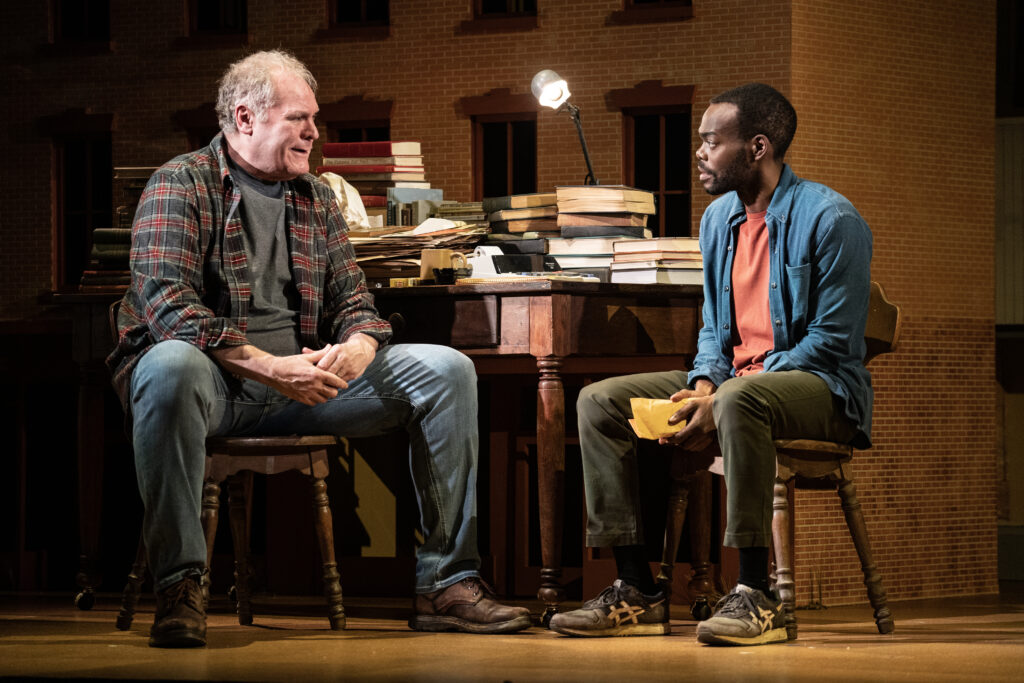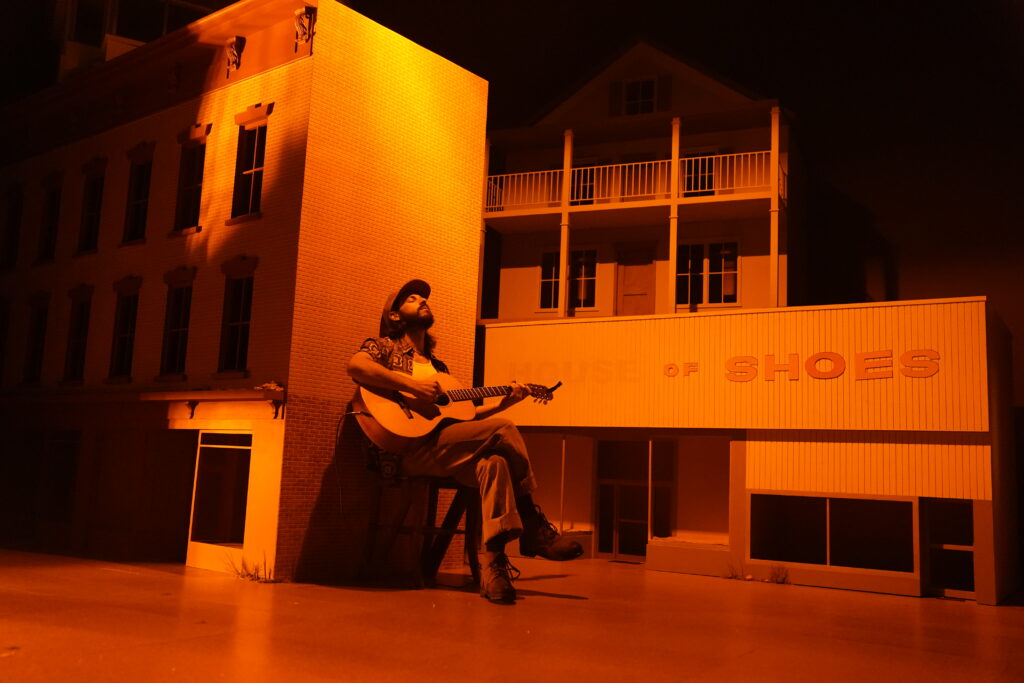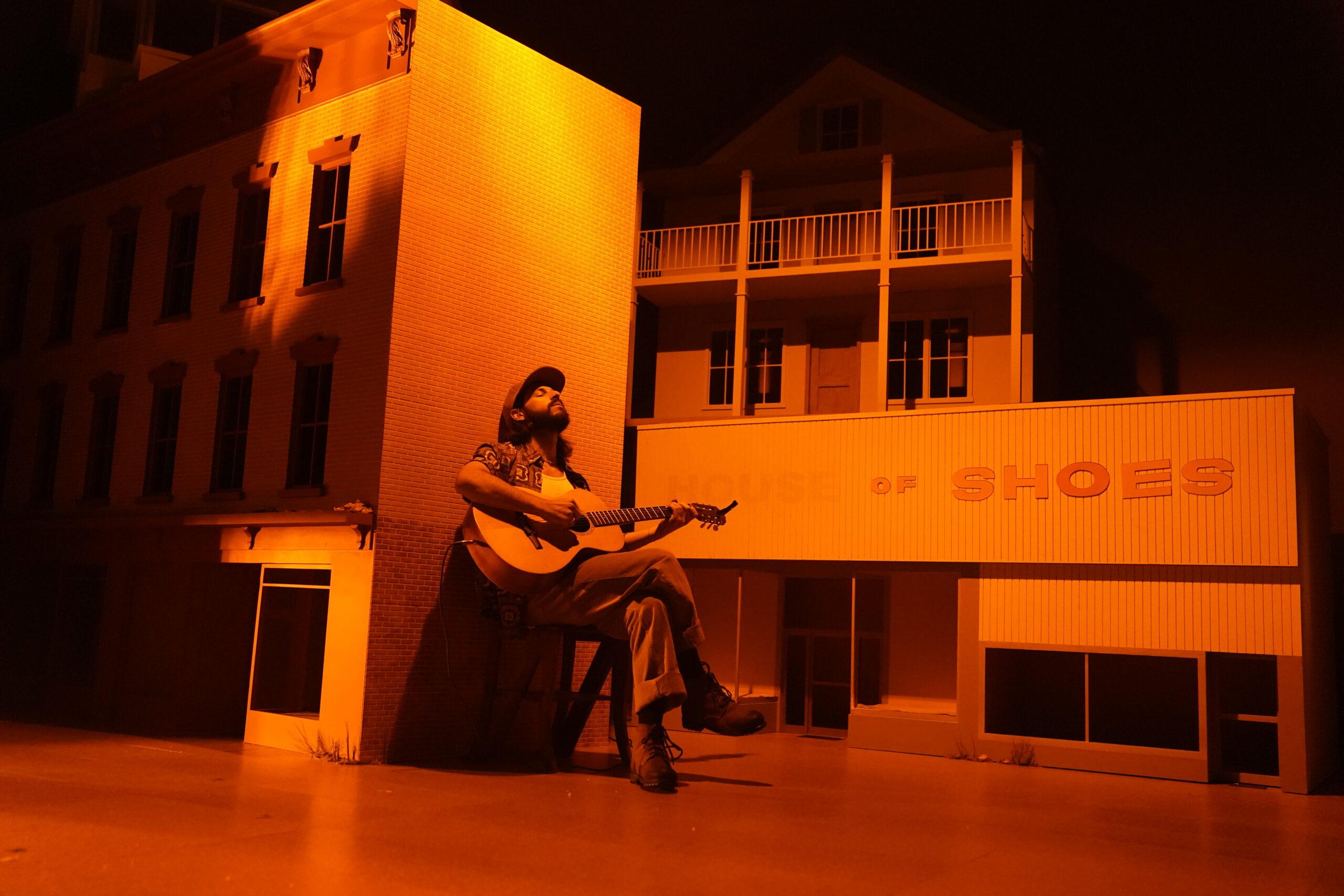Theater inspires us to look for what’s good. It contemplates the foresight of a world that thrives. You might say that theater breathes life into marvels and wonders, bringing our most cherished dreams on stage. But often the real miracle of performing arts hides in finding magic in the trivial – in reframing our experience of every day into a purposeful narrative. And that’s just what playwright Eboni Booth achieves in her latest play, Primary Trust, which tells the story of Kenneth, a bookstore worker, who is forced to consider new beginnings after he’s suddenly laid off. Perhaps this is theater: contemplating prospects of change that we had yet to explore.
“I go to art for a feeling of community and that sort of recognition of ‘oh, shoot, I’m not the only person who thinks that! I’m not the only person who does that. You know, I belong to a bigger world’,” playwright Booth reveals to us. Written just before the pandemic, Primary Trust seems to address the isolation most of us suffered from and the need for company we craved in 2020.

Booth transitioned into the writing world after having set a career as an actress in New York, with both theater and screen credits. Her interest in writing developed organically as she always showed a curiosity for the development of plays, participated in workshops and readings, and was an avid reader herself. Stepping into playwriting “just sort of seemed the right way to combine the two interests,” she tells us. Booth is a recent graduate of Julliard’s highly competitive playwriting program, during which she wrote Primary Trust.
Directed by Obie-winning director Knud Adams, the play will add to the extensive history of the Roundabout Theatre Company, an integral part of New York City’s theater scene, which fosters inclusive narratives that educate, support and inspire the citizens of tomorrow. The cast sees Emmy nominee William Jackson Harper wearing the shoes of the leading role, Kenneth. “I remember being an audition reader when he was auditioning,” Booth says as she tells V about the dream of seeing her text being performed by artists she has always admired. And what a coincidence – to suddenly find each other again, years later on an Off-Broadway stage.
Harper is mostly known for his portrayal of “Chidi” in NBC’s “The Good Place” from 2016 to 2020, his work in Barry Jenkins’ Amazon limited series “The Underground Railroad,” and the A24 thriller “Midsommar” with Florence Pugh. He is joined on stage by award-winning performer April Matthis who recently made her Broadway debut in August Wilson’s The Piano Lesson, alongside Samuel L. Jackson, John David Washington, and Danielle Brooks; by Brooklyn-based actor Eric Berryman, and by actor and writer Jay O. Sanders.
Discover the full interview with Eboni Booth below
V Magazine: How did you begin writing?
Eboni Booth: My background is in acting. I was pursuing acting for a really long time. I was hustling and auditioning for years and years and wasn’t really getting work. Then, I reached a point a few years ago where I was lucky enough to get cast in some shows off-Broadway, but I was also doing a lot of new play development and a lot of workshops and readings. When you do that, you see how stories and plays get put together, and I was paying attention to how writers went about creating their own work. A lot of the questions I found myself asking had to do with larger things in the play – not just my character anymore. They were questions about world-building and story arcs of characters other than my own. So it just seemed like the right way to combine the two interests.
V: I read that you have both film and theater credits. How does your experience as an actor inform your writing?
EB: Because I was an actor for so long, as a writer, I always want to give actors fun things to do. I want it to be something they can sink their teeth into. So even if the part is small, I try to make it as active as possible. As a writer, I’m really sensitive and want to make sure that I do as much as I can on the page and give the actor as much as they possibly need in order to lift the story without having to just rely on their performance.
V: Going into Primary Trust, can you tell us a little bit about where this story comes from?
EB: It’s a lot of ideas. I worked in bars and restaurants for a really long time and so I love that industry. But I’ve also spent a lot of time drinking and letting my imagination get away from me. And sometimes it feels good and sometimes it feels really complicated. The feeling I get – the sort of loneliness and the ache I get when I drink too much is something I wanted to try to capture. I wanted to write about a bank scandal, and that didn’t happen at all. Instead, I wrote about this lonely guy who is trying to find himself in this little town. This idea of sitting at a bar alone and just wishing they were someone else or someplace else really resonates with me. And so I just followed that thread.

V: Do you think the settings of your plays are meant to reflect the feelings inherent in your characters?
EB: I do like stories about work. You know, work has been such a big part of my life. I waited tables and bartended for almost 20 years. I was always very conscious of money, how I got it, and how quickly I could not have it. I think I found family in the work environment. So it makes sense for me to set stories there. There were times when I’ve sort of done my best thinking about life’s biggest questions in places that wouldn’t encourage that. I don’t go to church, but I think there have been times in Target or at a Chili’s restaurant when I’ve really pondered my existence in a profound way. And there’s something about seemingly innocuous environments that can provoke a lot of feeling. I’m interested in the possible tension there.
V: And what was it like to bring the play from paper to life?
EB: I wrote it right before the pandemic, actually. I was in my second year at Julliard in the playwriting program. I had to write it quite quickly, and I’m actually not a fast writer. I actually write really slowly, but maybe that was good because I had to get out of my own way. When the pandemic came, it was hard to understand or imagine how theater would evolve, but Roundabout Theatre reached out and said they had read it. They were so lovely, so generous, and so supportive. And because of that experience, it was able to stand outside of my imagination, which is what you always hope for your writing.
V: How did you cast the two leads for Primary Trust?
EB: William Jackson Harper is an actor I’ve just adored for years. I remember being an audition reader when he was auditioning for something. He’s just remarkable, and so honest. He’s also so smart and vulnerable – he really sits with all of that discomfort. Similarly, April, I’ve admired from afar. I know April and Will through the theater community, but I just love her work so much. Knud has worked with her a few times and we always talked about the opportunity to get to work together. I feel so lucky that they were both able and willing to do it.
V: Obie-winning director Knud Adams, known for his experimental approach and vision, is directing this play. Could you tell us a little bit about this collaboration and how it comes into play?
EB: I met Knud almost seven years ago when I was still acting. He directed me in a play at the Ice Factory years ago. I was really impressed by him – he’s really rigorous and really hardworking. He really tries to seek out authenticity in a way that was really appealing to me. He can work on things that are pretty straightforward but also things that are a little more formally inventive. That’s really interesting to me. He takes the time to let things come into what they are. Also taste-wise, we have a lot of overlap. We’re both really drawn to stories with a fair amount of vulnerability and mystery and some slight menace around the corner. It felt like a really good match in that way.
V: Can you share with us the process of revision and rewriting once you are preparing the text for a big audience? How does that work?
EB: For me, once I write something, and then listen to it in my head, I’ll know. Sometimes it just doesn’t sound right, and I don’t know why. It’s just wrong. And the nice thing about actors is that, as soon as they get up on their feet, you start to see, “Oh shoot, that doesn’t work at all.” That’s what I’m listening for. Rehearsals are only three and a half to four weeks, so you’re a little bit in a crunch, just trying to figure out how to make it as legible as possible. I want it to make sense to people other than myself. And with very good actors, it very quickly becomes evident.
V: Do you have any writers you have looked up to as you embarked on this career path?
EB: There are so many people I admire. Lately, I’ve been really inspired by a lot of prose writers. When I was writing this, the two writers who come to mind are Edward P. Jones. I liked the way he looked at both the macro life questions and the minutiae of life. There’s also Kathryn Schulz, who writes for The New Yorker, and she just had a book come out last year called Lost and Found. Those two writers are interesting to me, especially how they write about love and loss – and the possibility of human connection.
V: What do you want viewers to take away from this story?
EB: What do I want people to take away? My impulse behind writing was just feeling very alone and feeling a little isolated in some of the feelings I had a lot of doubts about my future and my abilities. And I found that I go to art for a feeling of community and recognition. Like, “Wow, I’m not the only person who thinks that! I’m not the only person who does that. I belong to a bigger world.” And there’s something in that connection that makes me feel – however temporarily – like, “Oh, maybe I’ll be okay.”
Primary Trust written by Eboni Booth and directed by Knud Adams opens for previews at the Laura Pels Theatre on May 4, 2023.
This feature appears in the pages of V142: now available for purchase!
Discover More



